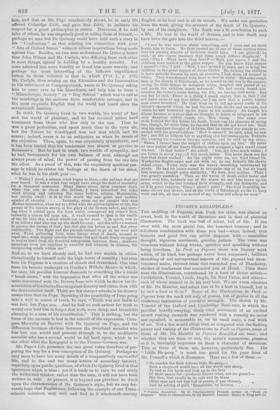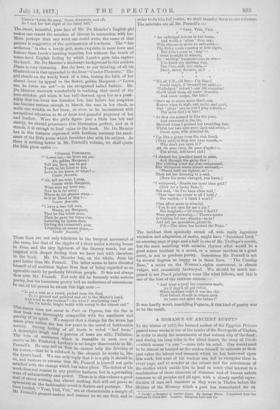PEGASUS RESADDLED.* Tim saddling of Pegasus, with Puck for rider,
was almost an event, both in the world of literature and in that of pictorial illustration. The book was full of talent, full of life. It ran over with the most genial fun, the heartiest humour ; and in felicitous combination with these you had—what, indeed, true humour and good fun can never dispense with — masculine thought, vigorous sentiment, genuine pathos. The verse was vivacious without being trivial, sportive and sparkling without being frivolous. In Puck on Pegasus there was literary work which, of its kind, has perhaps never been surpassed ; brilliant sketching of not unimportant aspects of life, piquant but unen- venomed satire, rhymed sense that reminded you of Thackeray, strokes of tenderness that reminded you of Hood. Then there were the illustrations, contributed by a host of clever artists- Cruiksbank, Tenniel, Leech, Doyle, Sir Noel Paton, and others— each of whom seemed to do his very best. We are warm admirers of Mr. Du Maurier, and admit him to be a host in himself, but is he such a host as these ? Some of the illustrations in Puck on Pegasus bear the mark not only of genius, but of genius in all the exuberant fascination of youthful strength. The sketch by Mr. Tenniel of the Oxford and Cambridge Boat-race, in which the peculiar heavily-swaying, dimly-vital movement of an excited crowd rushing onwards was rendered with a veracity we never saw equalled, is memorable as, on its small scale, a real work of art. Not a few would allege that, as compared with the flashing power and variety of the illustrations to Puck on Pegasus, some of those of Mr. Du Maurier to Pegasus Resaddled are tame ; and whether they are tame or not, the artist's mannerism, pleasant as it is, inevitably impresses on them a character of sameness. Two or three of them are, however, particularly fine. His "Little Bo-peep" is much too good for the poor lines of Mr. Pennell's which it illustrates. Here are a few of them :— " No wonder the flock follows little Bo-peep,—
Such a shepherd would turn all the world into sheep, To trot at her heels and look up in the face Of their pastor for—goodness knows what, not for grace ?— Her face, that recalls in its reds and its blues (Blue oyes and red lips full of pearls, if you choose), And its setting of gold, Esmeralda,' by Greuze
* Pegasus Resaddled. fly H. thohnondeley Pennell, Author of Puck on Pegasus." With 10 Illustrations, by Du Manlier. London: Henry S. King and Co.
There's 'Little Bo-peep,' dress, diamonds, and all, As I met her last night at the fancy ball."
The sweet, beautiful, pure face of Mr. Du Maurier's English girl makes one resent the mention of Greuze in connection with her. More perhaps than any word one could write, the name of that painter is suggestive of the quintessence of lewdness. The "fair archeress " is also a lovely girl, more exquisite in mere form and feature than Leech's hunting beauties, but without the touch of home-bred English feeling by which Leech's girls take captive he heart. Mr. Du Maurier's landscape background to this modern Diana is very charming. But the best, to our thinking, of all his Illustrations is that appended to the lines "Center Fleurette." The girl stands on the weedy bank of a lake, testing the faith of her absent lover by appeal to the flower, golden Margaret—" Loves me, he loves me not"—in the recognised ballad fashion. Mr. Du Manlier succeeds wonderfully in realising that mood of the love-stricken girl when it has half-dawned upon her as a possi- bility that her lover has forsaken her, but before her suspicion has become serious enough to blanch the rose in her cheek, to 'write one wrinkle on her brow, or even to be inconsistent with scrupulous attention to fit of dress and graceful piquancy of hat and feather. 'Were the girl's figure just a little less tall and stately, we should pronounce this illustration perfect, and as it stands, it is enough to lend value to the book. Mr. Du Maurier has in this instance expressed with faultlem accuracy the senti- ment of the little poem which furnishes him with his subject. As there is nothing better in Mr. Pennell's volume, we shall quote the little piece entire : • CONTER FLEURETTE.
"'Loves me,--he loves me not.' Ab, golden Margaret! Tell me, then, has he got Truth in his heart or not, Love in his heart, or what ?— Confer fleurette.
"..4h, tell me true, I pray, Gentle white Margaret, What does my lover say, Now he is far away
Where do his glances stray— Is it at Maud or May ?— Center fieuretle.
'41 have a fear full sore,
Weary, my Margaret, That he has taken more Than ho gave ten times o'er, Loitering by lattice-door, Listing the stroamlet's pour, Lingering on sunset shore,— C'onter ,fleuretle."
These lines are not only felicitous in the buoyant movement of the verse, like that of the ripples of a river under a strong breeze in June, and the airy lightness of the literary touch, but are inspired with deeper feeling than we have met with elsewhere in the book. Mr. Du Meunier has, on the whole, done his part better than Mr. Pennell. The latter seems to have divested himself of all ambition higher than that of being regarded as an agreeable rattle by perfectly frivolous people. It *as not always thus with Mr. Pennell. Not only did he formerly write serious poetry, but his humorous poetry had an undertone of earnestness. In one of his poems he struck this high note :— "Is not a man as a sword, picked from the dust, To be ground and polished and set to the Master's hand,
And tried in the furnace ?—for what ? everlasting rnst ? No, for battle, bright battle with wrong to the utmeet end."
This stanza does not occur in Puck on Pegasus, but the fun in that book was thoroughly compatible with the manliness and gravity of its spirit.. We suspect that a change for the worse has taken place within the last few years in the mood of fashionable society. Strong
a
feeling of all kinds is voted "bad form." A downright laugh and passion of tears are alike Philistine. The vein of sentiment which is traceable in such Ver8 de societi as Mr. Frederick Locker's is no longer discoverable in Mr. Pennell's. He may tell us that he cannot help the frivolity of his verses,—that he is subdued to the element he works in, like the dyer's hand. We can only reply that it is a pity it should be so, and venture to surmise that Mr. Pennell is himself not quite satisfied with the change which has taken place. The defect of his 'work does not consist in any positive badness, but in a pervading want of substantiality and power. There is in this volume a good deal of clever writing, but almost nothing that will not prove as ephemeral as the fashionable mood it flatters and portrays. The lines headed, " Veni, Vidi, Vici," are as characteristic a sample of Mr. Pennell's present matter and manner as we can find, and in order to du him full justice, we shall tiansfer them to our columns. The asterisks are all Mr. Fennel's :— " VENI, VIDI,
•
"An unfledged heiress in her teens, And worth a 'plum' they say ; With charms to move an anchorite— The Duke made running at first sight, But didn't seem to stay '- 1 moan to-night to wire-in, No waiting' business—run to win— You know my slashing way,
The Vent, vidi, vici style,—
Short, sharp, decisive, eh?
"It's all U-P., old boy,—I'm done!
Could laugh, if %weren't for spite ;— 'Unfledged,' indeed I—an old coquette! She'll teach them all center fleurette, And confer scalps, the kite!
"She's up to every move that's out,
Knows when to sigh, and smile, and pout, And 'plays' you as you'd play a trout,— The more fool Ito bite !
"At first she seemed to like the pace, And answered to the bit, Blushed when I praised her twinkling feet, Whilst liar two eyes grew dark and sweet,— Green eyes, with mischief lit.
"I'm like a grape from the rich South (They said) to drop into your mouth,— Why don't you open it ?' AA, lea yens verts, les veux crenfer !— The artful, doll-faced chit!
"1 olasped her jewelled hand in mine, And through the galop flew ; Her yielding waist ray arm compressed, Her whispered words almost caressed,—
' Please hold me tighter, so ' ;— Then led her drooping to a seat.
(Here the scene changed, you know.) "I whispered, Hearts are more than gold!' (Now for a lucky fluke!) She said, So I've been often told,' 'Then hear me swear to all I hold ;' She smiled,—' I think I won't!'
(One effort more to wire-in) You do not care for me a pin !'
She laughed,—' Of course I don't!' Then gently yawning,—' There's mama Is looking for me—thanks—ta-tal' And left me speechless, plan Ii lit, P.S.—The minx has hooked the Duke.'
The incident thus spiritedly struck off, with really ingenious variation and adaptation of metre, might have "furnished forth" an amusing page or page and a half in one of Mr. Trollope's novels, but the mere matching with suitable rhymes what would be a good minor incident in a novel, or a minor incident in a good novel, is not to produce poetry. Sometimes Mr. Pennell is not by several degrees so happy as in these lines. "The Coming Race," a satire on the Woman's-rights movement, is almost vulgar, and excessively hackneyed. We should be much sur- prised to see Punch printing a verse like what follows, and this is one of the best of the thirteen stanzas :— " And what a howl the creatures made, As if they'd all got rabies, When mothers ruled it was the chic That fathers should in future stick At home and mind the babies!"
It was hardly worth resaddling Pegasus, if this kind of poetry was to be the result.



































 Previous page
Previous page